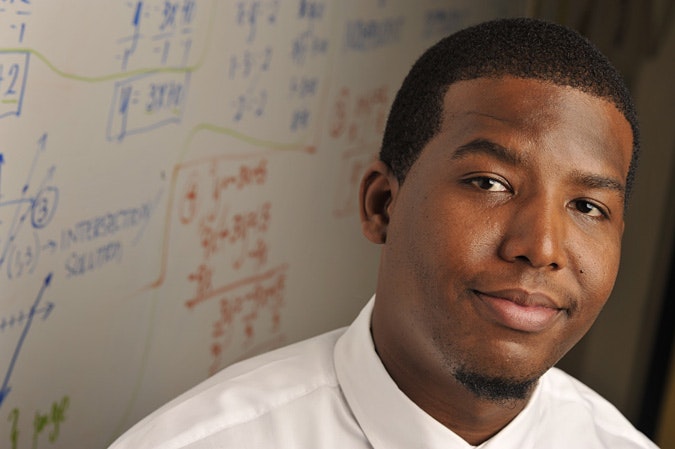How a Debate League Changes Young Lives
By Debra Rubino

As a child, Jarrell Anderson had grown-up responsibilities.
His parents abused drugs, leaving him—a middle-schooler—in charge of his younger siblings.
“I had to get up to feed my brother and sister, make sure they took a bath, and sometimes, find them babysitters so I could go to school,” says Jarrell. “Sometimes, my parents would disappear for weeks and I had to worry about where our next meal was coming from or how the light bill was going to get paid.”
Not surprisingly, Jarrell had very little interest in paying attention or doing his work in school.
“I didn’t have the same childhood that everyone else had,” he says. “Sometimes I would go hang out with my friends and get in trouble. Sometimes I wouldn’t come back until the next morning. In school, it affected me in a lot of ways. Sometimes I would just be so tired, I couldn’t stay awake in class. I acted out a lot, got suspended numerous times. I had a lot of anger inside of me.”
After the one constant in Jarrell’s life—his grandmother—died, things went from bad to worse. The family moved around from place to place, and Jarrell felt more lost and overwhelmed than ever before.
“I was looking for something to get involved with that would keep me away from home,” he says.
Luckily, in the 10th grade, a teacher suggested that because of his “mouth and attitude,” he might do well to join the Baltimore Urban Debate League, which had only recently gotten started at Walbrook High School.
Why not, he thought. It’s something to do.
So he tried debate—and was forever changed.
"I loved the fact that you could get up and talk and at that moment you were the only one that mattered; everything that you had to say was listened to,” he says. “As a young adult, all I ever wanted was just my personal space and a voice for myself.”
Debate provided that space for Jarrell and for the thousands of other Baltimore City youth who have participated in the program since its inception twelve years ago.
“By giving them the tools and the gift of their own voice—helping them realize they have the ability to change the things in their own lives—debate helps to change lives,” says Pamela Block, executive director of BUDL.
New, independent research shows that students who participate in debate achieve at higher levels than their fellow students, attend school more often, and pursue higher education at greater rates.
Jarrell’s life is a testament to just that.
After participating in BUDL and being mentored by a caring, supportive coach, Jarrell improved his grades, graduated in the top 10 percent of his class at Walbrook and went on to graduate from Georgia State University.
“I think it’s the questioning you do in debate that gets you involved in your academics,” says Jarrell. “You get immersed in the information. It makes you start wanting to do better, write better, read better, speak better.”
It also gave him the tools he needed to adopt a new—and independent—way of thinking.
“It was hard some days to hear my mother screaming and crying for me to stay home with her,” he says now. “She didn’t want me to leave her and go to school. I think the debate training helped me because it taught me to look at both sides of an argument. So I started to understand that there was another way to look at what was happening in my life and that I had choices. And so I had to choose to go to school.”
The training also encouraged Jarrell to leave all that he knew in Baltimore to go to college, despite many members of his family being “a bunch of naysayers.”
“Some people say, ‘I want to get an education,’” he says. “I said, ‘I had to.’”
College transformed him into “a totally different person,” Jarrell says, and gave him a strong determination to give back.
So after six years away, Jarrell accepted a position as elementary/middle school program coordinator for an organization he knows well: The Baltimore Urban Debate League.
In that position, he is helping BUDL bring debate into the lives of children who are about the same age he was when life was a blur of chaos and trauma.
“I’ve been through so much; I just wanted to make sure that young people had the things that I had,” he says, such as a mentor, coach, and an education. “Debate gave me all those things. And now I see the changes in myself and I want to help other kids take advantage of the gifts they’ve been given.”
The Baltimore Urban Debate League, an organization incubated by the Open Society Institute–Baltimore, engages Baltimore public school students in after-school debate training, independent research activities, debate team practice sessions, and monthly competitive policy debate tournaments.
Modeled after debate programs the Open Society Foundations launched internationally, the Baltimore Urban Debate League started out 12 years ago in 8 of the toughest high schools in Baltimore’s school system. Today it is the largest academic after-school program in the city, with programs in 35 high schools, 25 middle schools, and even some elementary schools.
Until June 2015, Debra Rubino was the director of strategic communications at OSI-Baltimore.